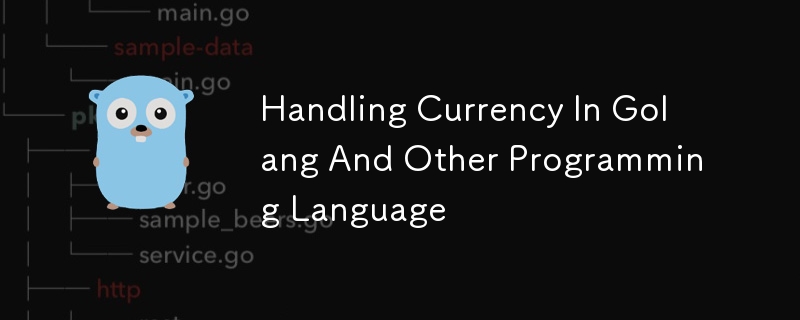
用编程语言处理货币是软件开发的一个关键方面,特别是对于处理金融交易、电子商务、银行和会计系统的应用程序。货币价值的准确表示和操纵对于避免可能导致重大财务差异的错误至关重要。
本文将通过 Go 语言的示例探讨处理货币的最佳实践。
处理货币时最关心的问题之一是准确性。与可能引入舍入误差的浮点数不同,货币值需要精确的表示。
考虑以下代码
package main
import "fmt"
func main() {
var a float64 = 1.1
var b float64 = 1.2
var c float64 = 1.3
fmt.Println(a + b + c)
}
上面的代码将打印
3.5999999999999996
由于计算机的内存有限,大多数编程语言(包括 Go)都使用 32 或 64 位存储基于 IEEE-754 标准的浮点数,即使使用 64 位精度也不可能存储无限数量的数字,这意味着这些数字在某些时候会四舍五入,这使得它们本质上不精确,并且执行的计算越多,它们就越不精确。
有很多方法可以解决这个问题,例如使用第 3 方库或您使用的编程语言具有本机支持。 在 Go 中,有几个库,包括:
感谢 kennfatt 策划了这个图书馆列表
选择正确的库来处理货币编程需要考虑几个因素。这是一个指南,可帮助您选择适合您需求的十进制库
确保库支持精度和准确性满足您的要求。如果处理非常大的数字或非常精确的计算,请寻找任意精度的功能。
图书馆应该有清晰、全面的文档。它应该很容易与您现有的代码库和工作流程集成。
考虑性能影响,尤其是当您执行大量计算或在高频交易环境中操作时。
确保功能满足您的需求,从舍入、加法、减法、乘法、除法等基本算术到更复杂的数学运算。
一个拥有良好支持和活跃社区的库对于获得帮助和找到问题的解决方案至关重要。 寻找积极维护和更新的库。
本文将使用第三方库 govalues/decimal 作为代码示例,因为文档简单易读,适合代码演示的需要
package main
import (
"fmt"
"github.com/govalues/decimal"
)
func main() {
a, _ := decimal.Parse("1.1")
b, _ := decimal.Parse("1.2")
c, _ := decimal.Parse("1.3")
a, _ = a.Add(b)
a, _ = a.Add(c)
fmt.Println(a.String())
}
上面的代码将打印
3.6
在上面的例子中没有精度损失,但是由于内存有成本并且不是无限的,小数点后的数字仍然有限,控制小数位数很重要,在这个例子中你可以使用decimal.ParseExact()设置大小
存储在数据库中也需要仔细考虑以保持精度和一致性。
大多数关系数据库都有特定的货币值类型,例如 DECIMAL 或 NUMERIC。
就像编程一样,避免将货币值作为浮点数存储在数据库中。
例如在 MySQL 中
CREATE TABLE `users` (
`id` int,
`balance` decimal(6, 2)
);
package main
import (
"database/sql"
_ "github.com/go-sql-driver/mysql"
)
func main() {
db, err := sql.Open("mysql", "root:root@tcp(127.0.0.1:3306)/test")
if err != nil {
panic(err)
}
_, err = db.Exec(`
CREATE TABLE test (
id int,
balance_decimal decimal(16, 8),
balance_float float(16, 8),
PRIMARY KEY (id)
);
`)
_, err = db.Exec("INSERT INTO test (id, balance_decimal, balance_float) VALUES (1, 1.1, 1.1)")
_, err = db.Exec(`
UPDATE test
SET
balance_decimal = balance_decimal + 1.2 ,
balance_float = balance_float + 1.2
WHERE id = 1;
`)
}
上面的代码会产生
| id | balance_decimal | balance_float |
|---|---|---|
| 1 | 2.30000000 | 2.29999995 |
Data transfer also requires careful consideration of precision. a correct format is required
For example in JSON format, using type string guaranteed precision across any programing language
package main
import (
"encoding/json"
"log"
)
type Data struct {
Decimal string `json:"decimal"`
Float float64 `json:"float"`
}
func main() {
payload := []byte(`{"decimal":"999.99999999999999","float":999.99999999999999}`)
result := Data{}
_ = json.Unmarshal(payload, &result)
log.Print("Decimal: ", result.Decimal)
log.Print("Float: ", result.Float)
}
Above code would print
Decimal: 999.99999999999999 Float: 1000
Handling currency in programming languages requires careful attention to detail to ensure precision, accuracy, and consistency. By using appropriate data types, libraries, and best practices, developers can avoid common pitfalls and ensure their applications handle currency correctly. Proper handling of currency not only prevents financial errors but also enhances user trust and confidence in the application.
There's no single best library for everyone. Each project has different needs. You should think about what's good and bad about each library based on what your project requires.
以上是在 Golang 和其他编程语言中处理货币的详细内容。更多信息请关注PHP中文网其他相关文章!




